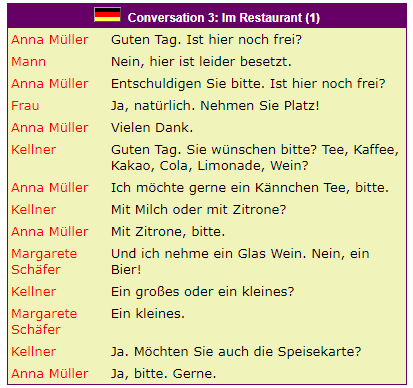
das Restaurant---This is written as in English but it is pronounced quite differently.
im Restaurant---in the restaurant
Ist hier noch frei?---"Is this seat taken?" Literally: "Is here still free?"
entschuldigen Sie bitte---"Excuse me please". This is the most polite way of gaining somebody's attention.
leider---unfortunately
hier ist leider besetzt---"Unfortunately, this seat is taken". The word "besetzt" is also used to translate "engaged" both for a phone-line and a toilet cubicle.
natürlich---of course; naturally
nehmen Sie Platz---"Take a seat". This is a word-for-word translation of the English, with the indefinite article being omitted. Both this phrase and "Entschuldigen Sie, bitte" are requests / instructions. In the "Sie" form, this means that the subject and the verb are reversed such that the verb is the first element in the sentence.
der Kellner---waiter
der Tee---tea
der Kakao---cocoa
die (Coca-)Cola---No need to translate this one, but note that this is feminine in German. It is "das Coke" however!
die Limonade---lemonade
der Wein---"wine". Most alcoholic drinks turn out to be masculine.
ein Kännchen Tee---"A pot of tea". As with the glass of wine, the word for "of" is omitted in German after a noun of quantity.
die Milch milk
die Zitrone---This means "lemon". Tea is usually drunk in German-speaking countries with lemon - and from a glass. If you want milk rather than lemon you will need to ask for "Tee mit Milch".
gleich---immediately
und ich nehme....---and I'll have...
das Glas glass
ein Glas Wein---This means "a glass of wine". Here too there is no word for "of" in German after the noun of quantity.
das Bier---The German for "beer" is one of the few words for alcoholic beverages which is neuter, not masculine.
ein großes oder ein kleines?---"a large (beer) or a small (beer)". As in the earlier section, the noun does not need to be repeated. We will discuss adjective endings in a later section.
Möchten Sie auch...?---Would you also like...?
die Speisekarte---"The menu". Literally: "The food card". You might also hear it reduced to "die Karte".
 英语
英语 日语
日语 韩语
韩语 法语
法语 西班牙语
西班牙语 意大利语
意大利语 阿拉伯语
阿拉伯语 葡萄牙语
葡萄牙语 越南语
越南语 俄语
俄语 芬兰语
芬兰语 泰语
泰语 丹麦语
丹麦语 对外汉语
对外汉语

